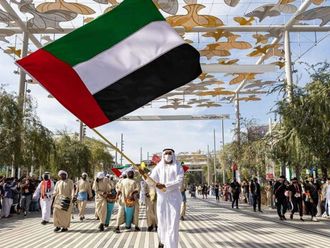
Abu Dhabi: Police here revealed that begging on social media has become a profitable means of earning sums that far exceed the traditional forms of begging, carried out by those who go door to door.
Authorities here cautioned residents and visitors regarding beggars exploiting their compassion and goodwill during the sacred month of Ramadan.
Abu Dhabi Police advised the public to refrain from engaging with beggars or being swayed by their schemes and deception aimed at soliciting money or assistance during Ramadan.
In a statement, the force said that the phenomenon of begging is a public concern as the beggars ask for money at the doors of mosques, on the streets, in markets and malls, and online.
Abu Dhabi Police urged everyone to join hands to confront all forms of begging, whether they are on the streets, public places or on social medial channels.
“Begging is an uncivilised act. Let’s help each other to eliminate begging, and help [the deserving through authorised channels]” the police stated.
As part of the fourth edition of its Ramadan campaign, “Our Month: Obedience and Commitment,” Abu Dhabi Police explained that beggars use social media as a tool to achieve illicit goals.
Electronic begging
Electronic begging has spread far and wide through social media platforms, especially with the start of the holy month of Ramadan and during the holidays.
The warning explained the most popular social media platforms used for soliciting money online include:
- X platform (formerly Twitter),
- Instagram,
- Facebook, and
- WhatsApp.
Fishing for sympathy often involves soliciting money or in-kind materials via text messages, humanitarian pictures, and other fabricated begging phrases – such as helping orphans, treating the sick, or building mosques and schools in poor countries, etc.
The AD Police statement urged community members not to send or transfer money to unknown people. The force also stressed on the importance of cooperation and solidarity to confront this dangerous scourge.
Police and security personnel warned that those who engage in electronic begging often hide behind social networking sites.
The beggars cheat people through made-up stories showing that they are needy, and seek assistance.
The number of beggars usually rises in the Emirates during Ramadan, as they seek to exploit people's generosity.
UAE Anti-begging Federal Law
According to Federal Law by Decree No. 31 of 2021 Promulgating the Crimes and Penalties Law, anyone caught begging in the UAE will be fined Dh5,000 and imprisoned for a term up to three months.
According to the UAE Penal Code, penalties apply for individual begging, organised begging and even unauthorised fundraising.
“Whoever commits the crime of begging by soliciting a material benefit in kind, of any form or by any means, shall be sentenced to a duration of not more than three months, and fined a monetary penalty of not less than Dh5,000,” the UAE Federal Law statess.
The punishment is more severe if any of the following aggravating circumstances are present:
- If the individual is not physically disabled.
- If the individual has a source of income.
- If the individual feigns disability or injury.
- If the individual claims to be proving a false service using the solicited funds.
- If there is any form of deceit involved to elicit sympathy.
Exploiting children into begging:
Exploiting children in begging is a serious crime punishable by law.
In accordance with Article 38 and Article 68 of Federal Law No. 3 of 2016 regarding the rights of the child, it is prohibited to commit the following crimes:
- Exploiting the child in begging
- Recruiting a child under conditions that violate the law
- Assigning the child to perform work that hinders his education or causes harm to his health or physical, emotional, moral or mental integrity.








